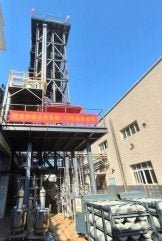
Scientists at China National Nuclear Corporation’s (CNNC’s) China Institute of Atomic Energy (CIAE) have achieved a breakthrough in low-temperature distillation of Boron-10 isotopes to stably produce enriched Boron-10 products, Global Times reported.
According to CIAE, Boron-10 possesses excellent neutron absorption characteristics and can be used as a neutron absorber or radiation shielding material in nuclear reactors for reactivity control and in emergency shutdown systems.
In nuclear power plants, the use of enriched Boron-10 acid reduces the amount of boric acid needed, lowers the risk of crystallisation, and mitigates cooling system corrosion, thereby enhancing the safety and economic efficiency of nuclear power plant operations, according to CIAE. With the growing global demand for clean energy and rising concerns for nuclear safety, the need for Boron-10 in the construction and operation of nuclear power plants has increased.
A research team led by Hu Shilin, an academician of the Chinese Academy of Engineering (CAE) and Chief Scientist at CNNC, has made substantial progress through years of effort and collaborative innovation in developing a groundbreaking process for Boron-10 isotope separation. He has established a complete-process apparatus facility based on low-temperature distillation. This facility operates continuously and stably to produce Boron-10 products with an enrichment level of 70%, according to CIAE.






